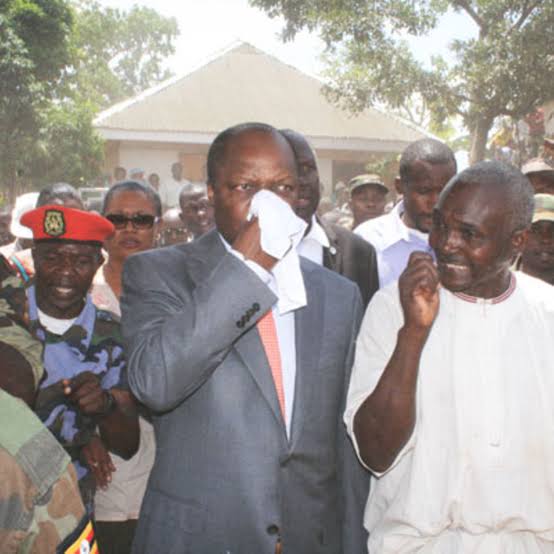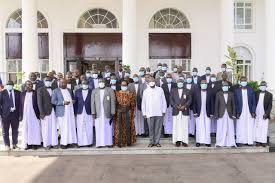By CHANGE OF GUARDS
The historically powerful Buganda Kingdom was abolished in 1966 due to the so-called Buganda Crisis. This development was a consequence of an ambitious Grace Ibingira seeking to use the Kingdom of Buganda in his sinister scheme to grab power from the then Prime Minister, Milton Obote. The resultant animosity between the Baganda and Milton Obote was something Museveni would later tap into 25 years later during his sectarian Bush War (1981-1985). In order to gain the support of the Baganda, in August 1981, Museveni, along with Prof. Lule, met the then Crown Prince Ronald Mutebi in London, where it was agreed to restore Buganda’s status as it had been before the 1966 Crisis. Museveni has repeatedly confirmed this incident.
“On my way to Libya, I passed through London, and Prof. Lule linked me up with Prince Mutebi.”
As a follow-up, the infamous 1982 Kikunyu Conference in Makulubita, Luwero, involved monarchists and the discussion of restoring the Buganda Kingdom to its pre-1966 Crisis status. Later, in 1985, Museveni faced the Katonga Bridge stalemate between his NRA forces and the allied forces, which included government troops and pro-Buganda fighting groups like UFM and FEDEMO. Worse still, the Baganda fighters within his NRA were grumbling over alleged discrimination. The greatly concerned Museveni sought the help of Crown Prince Ronald Mutebi, who was secretly brought into the so-called Liberated Zone, where he issued assurances to his Baganda supporters. Indeed, hardly two months later, Museveni’s NRA took power, and for the sake of legitimacy, his first government was dominated by Baganda.
Once he had captured power and consolidated his hold, Museveni embarked on sidelining the Baganda. After much delay, in 1993, the Army Council decided to grant the restoration of the Buganda Kingdom. Prince Mutebi was coronated as the King of Buganda, but the Kingdom was not granted the previously agreed-upon status. During the 1995 Constitution-making process, the idea of federalism as a form of governance was deliberately suppressed. Instead, the regime accused Buganda of harboring a secessionist agenda and began schemes to weaken the Kingdom. It reneged on the return of properties belonging to the Kingdom and created chiefdoms, such as the Ssebaruli and the Ssebanyala, in Buganda’s Buruli and Bugerere counties, respectively, to weaken the Kingdom further.
The growing animosity between the Kingdom and the Museveni regime reached a boiling point during the bloody Buganda Riots of September 2009. Museveni had blocked the Kabaka from visiting Layunga in his county of Bugerere, leading to riots by his subjects. The security forces responded by shooting dead 27 people, injuring hundreds, and arresting many others. The impasse was eventually resolved through a meeting between the Kabaka and Museveni at State House in October 2023. During the meeting, Museveni publicly disclosed that the Kabaka had been refusing to take his telephone calls for three years.

Buganda’s highly valued land has been the victim of a systematic land-grabbing scheme orchestrated by regime functionaries and agents using guns and ill-gotten cash. The primary weapon in this scheme has been the draconian land laws that have been enacted and continue to be imposed. In a November 8, 2021 letter to his CEC, Museveni urged members to fight the Buganda Land Board and to identify the legitimate interests of different groups of people, which he referred to as the crux of mobilization. Buganda Kingdom, and the Kabaka in particular, responded by cautioning his subjects against these detractors:
“We must all double our efforts to water down the falsehoods, malicious and hateful words that are intended to divert us from our quest for justice and advocacy on key issues pertaining to the Kingdom.”
The Restoration of Assets and Properties Act of 1993 guaranteed Buganda’s repossession of its assets being held by the regime. However, the regime has arrogantly maintained its hold on these assets.
In another attempt to weaken the Kingdom, Museveni met with the Bataka Clan Heads at State House in March 2023 without the knowledge of the Kingdom. He offered to buy them a two-and-a-half-acre piece of land for the construction of their office block. The $2.5 million (9 billion UGX) piece of land is located near the Kingdom’s headquarters at Bulange. This development further strained the already fragile relationship between the Kingdom and the regime. During the 30th Coronation Anniversary, the Kabaka responded:
“While we hold Buganda Kingdom dear to our hearts, there are those who don’t like the Kingdom. Therefore, do not be deceived… Although the Kingdom was reinstated, it has not been given full authority to carry out its duties as it did before.” — Kabaka Mutebi, August 2023.
For some time now, the Kabaka has been dealing with personal health issues, and his condition has been the subject of speculation by both supporters and detractors of the Kingdom. A few months ago, he privately left the country to receive treatment in Namibia. His absence from the Kingdom further fueled these speculations. On May 30th, the Prime Minister of Buganda Kingdom formally notified the Uganda High Commission about the Kabaka’s presence in Namibia for treatment. The notification requested that the High Commission coordinate with the government of Namibia to ensure the Kabaka’s security and privacy. It also requested that any visitors from Uganda wishing to see the Kabaka be cleared by the Katikiro. The High Commission duly complied and wrote to the government of Namibia on June 31st.
Rumors began circulating that the Kabaka had been exiled or held hostage in Namibia, and it was alleged that some Ugandans staged protests at Namibia’s diplomatic posts abroad. Consequently, on June 17th, the Ministry of Foreign Affairs sent a protest note to the Uganda High Commission, asking it to address the behavior of these errant nationals. In response, the Uganda High Commission notified the Ministry of Foreign Affairs of Uganda. It is likely that the Minister immediately informed Museveni, who chose to remain silent. Instead, on June 8th, Museveni held another meeting with the Kingdom’s Clan Heads, where he donated 200 million UGX to their SACCO and honored their request for the construction of their offices on the previously donated $2.5 million piece of land.
On July 9th, five of the Buganda Kingdom Clan Heads traveled to Namibia without the knowledge of the Katikiro. They claimed to be seeking a visit with the Kabaka but were blocked, arrested, and questioned by the police 200 km from the capital, Windhoek, on July 10th. The following day, on July 11th, Museveni hurriedly wrote to his Minister of Foreign Affairs, claiming to have only learned about the Kabaka’s presence in Namibia from the Bataka:
“…which the Ugandans did not know about until the Bataka told me on the 8th of June when they came with Hon. Ssebugwao. I told them that we were not aware and nor are we involved in the issue of HH Kabaka’s presence in Namibia.”
Consequently, the government of Namibia had to cancel the Kabaka’s stay in the country. Upon his return to Uganda, the Kabaka addressed his subjects, directly criticizing the Bataka and the Museveni regime:
“The situation we went through in the past months has led some people to ignorantly or deliberately disrespect and disregard the traditions of our land, and act in dishonorable ways. They have done much to misguide our people about the throne and the kingdom. This is dangerous. You must watch out for such people. All the time we have urged you to be united to protect and respect our heritage and traditions. This is the only channel the enemy can use if there is laxity in guarding our heritage. The king is not elected or chosen by the Clan Chiefs. The Superior Chiefs are known, and they know themselves and their responsibilities.”
The regime is attempting to create a diversion by promoting a false narrative that the Kabaka was referring to the NUP and Bobi Wine supporters, claiming that the insignificant so-called protests at Namibia’s diplomatic missions abroad pressured the government to cancel the Kabaka’s visa. The plain truth is that it was the visit by the five Clan Heads to Namibia that broke the camel’s back. They reportedly engaged the Namibian government authorities, including the Ministry of Foreign Affairs and the Ministry of Internal Affairs.
If you didn’t know, you now know. Watch out for more treacherous acts by the Bataka (Clan Chiefs).
INFORMATION IS POWER AND THE PROBLEM OF UGANDA IS MUSEVENISM







Discussion about this post